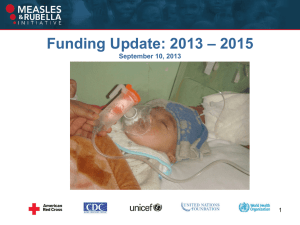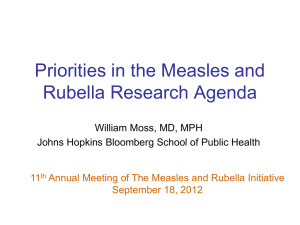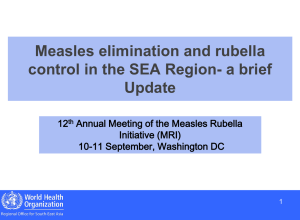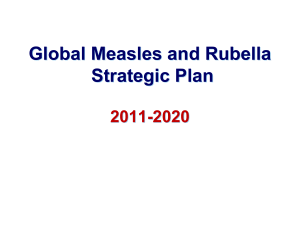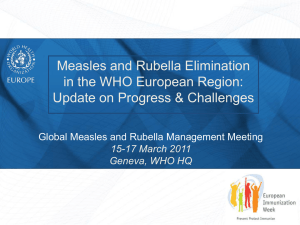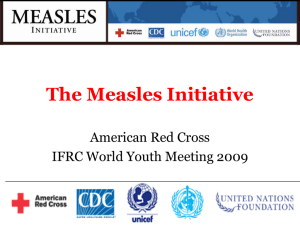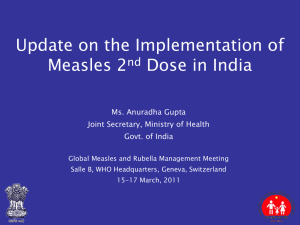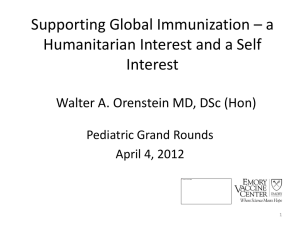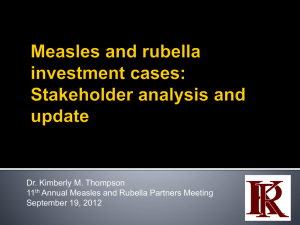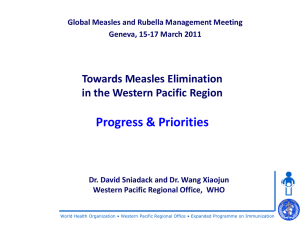EURO: Focus on Advocacy and Communication Response to
advertisement
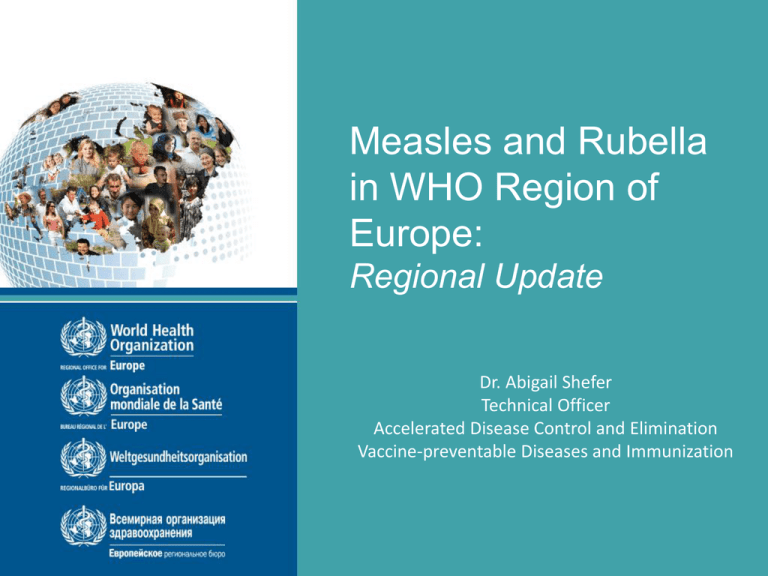
Measles and Rubella in WHO Region of Europe: Regional Update Dr. Abigail Shefer Technical Officer Accelerated Disease Control and Elimination Vaccine-preventable Diseases and Immunization WHO Region of Europe • 53 member states • 12 time zones • 4 official languages • Measles & Rubella/Polio elimination/eradication goals Elimination Goals http://www.euro.who.int/__data/assets/pdf_file/0003/88086/RC55_eres07.pdf Events in the WHO European Region, 1980–2013 100 90 600000 Vaccination coverage Number of reported measles cases 80 500000 Lowest number of measles cases recorded: 6936 400000 70 60 50 Elimination goal reset to 2015 300000 200000 All 53 Member States have 2-dose MCV schedule Accelerated package of action 40 30 20 100000 10 0 0 % coverage with measles-containing vaccine (MCV1) 700000 Measles in the WHO European Region, 1993–2013* 341 982 Lowest measles cases recorded 98% REDUCTION 1993 Bulgaria, 22 004 France, 14 949 37 073 30 625 Ukraine, 12 744 Turkey,* 6 547 25 022 20 601 * 6 936 2007 2008 2009 2010 2011 2012 2013* * Provisional data for January–June 2013. Rubella in the WHO European Region, 2000 and 2011–2013* 621 039 2000 98% Ukraine, 3 667 REDUCTION 9 672 2011 Romania, 20 812 Poland,* 35 740 30 509 36 097* 2012 2013* * Provisional data for January–July 2013. Percentage of reported measles cases by age group January-June 2013 30% 25% 20% 29% 26% 25% 20% 17% 14% 15% 10% 5% 5% 15% 9% 10% 10% 10-14 15-19 Age group (years) 30% 25% 21% 20% 15% 10% 13% 9% 11% 7% 6% 5% 5-9 10-14 15-19 20-29 ≥30 Age group (years) <1 30% (n=1750) 1-4 5-9 10-14 15-19 20-29 ≥30 Age group (years) Germany (n=1097) 26% 0% 5-9 1-4 United Kingdom 30% 5% 1-4 Georgia (n=5783)33% 0% 13% <1 6% 4% 0% <1 15% 35% ≥20 25% 20% 17% 15% 10% 16% 12% 10% 9% 9% 5% % of reported measles cases 20% 30% Turkey (n=6533) % of reported measles cases 33% % of reported measles cases % of reported measles cases 35% % of reported measles cases WHO European Region (n=20 533) 35% 25% 25% 20% 20% 15% 15% 12% 10% 10% 12% 6% 5% 0% 0% <1 1-4 5-9 10-14 15-19 20-29 ≥30 Age group (years) <1 1-4 5-9 10-14 15-19 20-29 ≥30 Age group (years) Progress towards goal All Member States use 2 doses of measles containing vaccine All Member States adopted rubella immunization programme Regional immunization coverage levels remained high Supplementary immunization activities (2005-2012) >>> 44.6 million doses with measles-containing vaccines 67 national and subnational laboratories are fully accredited Surveillance tools for evidence-based decision making are available e.g. immunization registries, genotyping data, seroprevalence studies, vaccine supply Challenges to Achieving Goals Suboptimal coverage and immunity gaps at subnational level Lack of national case-based surveillance for measles and rubella* Political, public, and health professional complacency Continued outbreaks and lack of comprehensive response Resources for low and middle income countries to address gaps in coverage * In 2012, 13 Member States lacked national case based surveillance for Measles and 29 for Rubella Root causes Awareness and risk/benefit perceptions at all levels • Public • Health Professional • Government Health care systems in transition • Funding, organization, and availability of services Advocacy and communication by WHO and national health authorities Target audiences •Parents, health care providers, underimmunized teenagers and adults, immunization programme managers •Diverse national, regional, and local cultures •Range of views on immunization: supportive, hesitant, antivaccination, complacent, uninformed Objectives •Educate about vaccine-preventable diseases and vaccines •Change immunization behaviour •Maintain or restore confidence in existing vaccines •Introduce and create demand for new vaccines •Inform on vaccine-related events, disease outbreaks •Interact – to influence as well as understand public’s views and motivations Accelerated package of action for the elimination of measles and rubella in the WHO European Region COMMUNICATIONS, INFORMATION AND ADVOCACY OUTBREAK PREVENTION AND RESPONSE 3 4 SURVEILLANCE 2 STRENGTHENING OF VACCINATION AND IMMUNIZATION SYSTEMS 1 http://www.euro.who.int/en/what-we-do/health-topics/disease-prevention/vaccines-andimmunization/publications/2013/measles-and-rubella-elimination-2015.-package-for-accelerated-action-2013-2015 5 RESOURCE MOBILIZATION AND PARTNERSHIPS 6 VERIFICATION OF MEASLES AND RUBELLA ELIMINATION 1. Strengthening of Vaccination and Immunization Systems National programmes Training of coordinators/mid level management on RED/Immunizations (1-2 subregional/yr) Training and follow-up missions to improve vaccine management (1-2 MS/yr) Assessment and follow-up missions on implementation on national regulatory authority improvement plans (4 missions total/yr) Training to improve immunization information systems (2 sub-regional/yr) National immunization technical advisory groups (NITAGs) Impact assessment of existing NITAGs and dissemination of results (by 2014) Promotion of NITAG establishment in 18 MS still lacking (visits to 2-4 MS/annum) Publication of guidance and best practice document (by June 2014) Guide to tailoring immunization programs (TIP) – see next slide Guide to Tailoring Immunization Programmes (TIP) Innovative Guide to assist Member States in tailoring vaccination responses to unique needs of most vulnerable populations – Diagnose problems and define subpopulations through quantitative and qualitative methods – Deliver targeted campaigns and services – Increase demand for vaccination Launched in April 2013 Status – Implementation in at least 2 Member States per year – In use 4 Member States by end 2013 Evaluation and resource requirements – Qualitative through online surveys, key informant interviews, focus groups http://www.euro.who.int/__data/assets/pdf_file/0003/187347/The-Guide-to-Tailoring-Immunization-Programmes-TIP.pdf 2. Surveillance Case-based surveillance Technical assistance plan to achieve case-based rubella reporting (2-4 MS/yr) Technical assistance plan to develop monthly CRS reporting (6-8 MS/end 2014) Implementation of MRSM* to improve surveillance reporting (4-6 MS/2013-15) Lab and epi data integration MS: Implementation of pilot to integrate lab/epi data (2-4 MS/by end 2014) Regional: MRLDMS* to integrate lab/epi data (by end 2013) Vaccine safety Publication of manual on vaccine safety risk management (2014); sub-regional trainings (3/ yr); training package for CME accreditation (mid 2014) * MRSM = Measles Rubella Surveillance Module; MRLDMS = MR Laboratory Data Management System 3. Outbreak response and preparedness Regional Guidelines for Outbreak Response (2013) Publication Sept 2013 Verification process for MR elimination Change to include requirement for submission of national outbreak response plans for review as part of annual status reporting (2014) Coordination of response to outbreaks in Region Measles outbreak in Caucasus and Turkey started in 2012 Sub-regional meeting attended by AZR, GEO, ARM (July 2013, Tblisi, GA) Consensus to conduct catch-up or SIAs – plans under development 4. Communication and advocacy, 2013 •Tools for HCWs and imm. programme managers – talking with parents about vaccines, TIP, managing response to vaccine safety events, etc. •Tools for parents – decision-making guides, smartphone immunizationreminder app •In-country communication capacity building – 3 sub-regional training programmes, national comms reviews, establishment of vaccine comm. working group (first in Estonia, template for other MS), high-level measles advocacy meeting, outbreak comms support in specific countries •Internet – “Gold standard” website template on imm. and vaccinepreventable diseases for public health authorities •Social media – smartphone apps, FaceBook, YouTube, Twitter, email, blogs, peer-sharing on EIW campaign site (increasingly important – governments at various stages of implementation and engagement with the public) •Public events – European Immunization Week (all 53 Member States participating), campaigns to introduce new vaccines, catch-up campaigns •Traditional media – high-profile M&R media interviews, op eds (Lancet) 5. Resource mobilization and partnerships Regional: Enhance cross border collaboration between Regions for outbreak response Secure funding source for revitalization of MECACAR* platform (by June 2014) Organization of cross-border (European and Eastern Mediterranean regions) coordination meeting (to be held by June 2014) Revitalize MECACAR Develop and endorse Joint MR Activity Plan * MECACAR = Middle East and Caucasus and Central Asian Republics 6. Verification of measles and rubella elimination National Verification Committees 37 established 16 pending Framework for the verification process ► Importance of high quality data 33 Annual Status Reports (2010-2012) ► Necessary information available at: www.euro.who.int MRI Support Needed Middle income countries (not GAVI eligible) Support for any kind of supplemental immunization activities Support for outbreak response Vaccine supply, with consideration of legal regulation in affected countries (vaccines registered for use) Developing new strategies to address susceptible population Adults HCWs Migrant population (diversity of groups and characteristics) Developing MS capacities to implement new strategies Legal Advocacy and communication SOP for health system (institutions and HCW) Supplementary slides Measles and rubella incidence per million total population and MCV1 Coverage, WHO European Region, 1999-2013 SIA conducted in selected Countries * Monthly MR reporting to WHO European region until July 2013 Source: Source: WHO/UNICEF JRF and month MR reporting to WHO European region Update : 05-Sep-2013 Confirmed measles cases by month, WHO European Region, 2005-Jul 2013 Source: Monthly MR reporting to WHO European region Update: 05-Sep-2012 Countries with highest number of measles cases in the WHO Europe, 2010 - 2013 Country Bulgaria France Ukraine Romania Turkey Italy Georgia United Kingdom Spain Germany Total % of all measles in the WHO Europe WHO Europe 2010 2011 2012 2013 21,664 5,019 42 187 15 864 22 397 285 805 155 14,966 1,313 4,178 105 5,187 64 1,083 3,507 1,600 1 859 12,744 7,247 698 691 30 1,903 1,210 168 15 190 1,959 1,041 6,983 106 6,451 1,811 105 1,385 21,835 21,034 16,058 12,653 7,801 6,848 6,567 5,194 5,107 3,958 29,300 32,158 25,551 20,046 107,055 95.95 87.28 90.28 88.36 90.44 30,537 36,845 28,301 22,688 118,371 Data as of 05 Sept 13; Source – CISID monthly measles and rubella surveillance, WHO Europe Total Countries with highest number of rubella cases in the WHO Europe, 2010 - 2013 Country 2010 2011 2012 2013 Poland 4,197 4,290 6,259 35,740 Romania 354 4,805 20,772 84 Bosnia and Herzegovina 1,861 23 0 0 Russian Federation 1 2 1,003 0 Ukraine 0 0 942 9 Italy 43 105 246 0 Georgia 60 64 67 163 Bulgaria 40 40 19 5 United Kingdom of Great Britain 12 and Northern 6 Ireland 69 10 Spain 9 10 63 3 Total 6,577 9,345 29,440 36,014 % of all measles in 97.65 98.74 99.46 99.77 the WHO Europe WHO Europe 6,735 9,464 29,601 36,098 Data as of 05 Sept 13; Source – CISID monthly measles and rubella surveillance, WHO Europe Total 50,486 26,015 1,884 1,006 951 394 354 104 97 85 81,376 99.36 81,898 Proportion of measles cases by age groups, WHO European Region 2010-2013 52.7% (>95 000 Cases) Data Source: Monthly MR reporting to WHO European Region *Data as of 05 Sep 2013 Proportion of measles cases by age groups, seven countries and the Region, 2010-2013 (>95 000 Cases) Data Source: Monthly MR reporting to WHO European Region *Data as of 05 Sep 2013 Immunization status as a percentage of measles cases, by age group, WHO European Region 2010-2013* (>95 000) Data Source: Monthly MR reporting to WHO European Region Data as of 05 Sep 2013 Case-based surveillance, European Region 2013 CASE- BASED REPORTING IS CRITICAL FOR ELIMINATION Measles incidence Jan-Jun 2013 and major outbreaks in the European Region Measles outbreaks in 2013 Azerbaijan Georgia Germany Netherlands Romania Turkey Ukraine United Kingdom Rubella incidence in Jan-Jun 2013 and major outbreaks in the European Region 2008-2013 Rubella outbreaks (2008 – 2013) Austria Bosnia and Herzegovina Georgia Italy Kyrgyzstan Malta Netherlands Poland Romania Russian Federation Ukraine Sixty-third Regional Committee 16-18 September 2013, Izmir, Turkey
